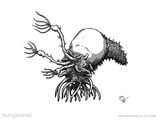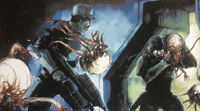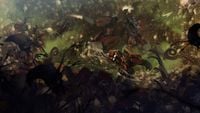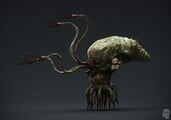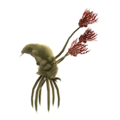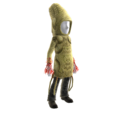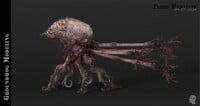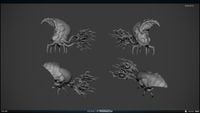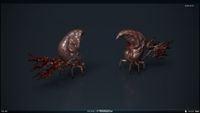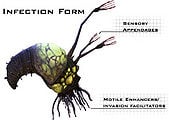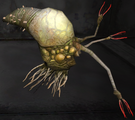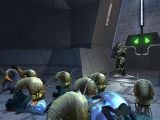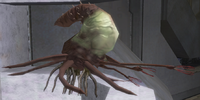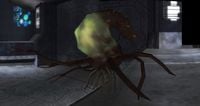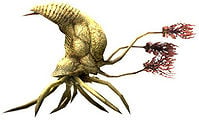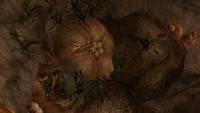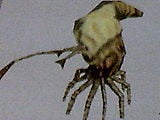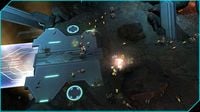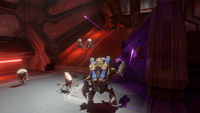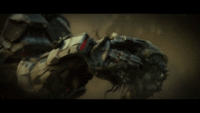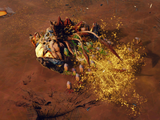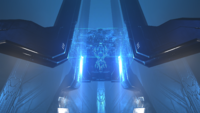Pod infector: Difference between revisions
From Halopedia, the Halo wiki
m (Bot: Fixing redirects) |
BaconShelf (talk | contribs) (Undo revision 1648650 by Ony2816 (talk) appreciate the effort, but the nickname and trivia aren't particularly notable) Tag: Undo |
||
| (143 intermediate revisions by 53 users not shown) | |||
| Line 1: | Line 1: | ||
{{ | {{Status|Canon}} | ||
{{ | {{Species infobox | ||
|variant=Flood | |||
|name = | |name=Pod infector | ||
|image = [[File: | |image=[[File:H2A - Flood infection form model.jpg|300px]] | ||
|height = | |latin= | ||
|distinctions = Small, | |classification=[[Infection form]] | ||
| | |species=[[Flood]] | ||
| | |subspecies= | ||
|diet= | |||
|height={{Convert|89.6|cm|ftin|sp=us}} to {{Convert|131.4|cm|ftin|sp=us}}{{Ref/Game|Id=Library|HCEA|Library (feature)|Library|Detail=Infection Form}} | |||
|weight={{Convert|16.8|kg|lb}} to {{Convert|28.6|kg|lb}}{{Ref/Reuse|Library}} | |||
|distinctions=Small, sac-like creatures with many tentacles for probing with a frond-like array. | |||
|lifespan= | |||
|homeworld= | |||
|techlevel= | |||
|notable-person= | |||
|othernames= | |||
|languages= | |||
}} | }} | ||
{{Quote|Do not let them touch you! It is said they will consume your body and mind!|[[Pavium]] warning his troops of pod infectors.{{Ref/Level|HW2|Fighting Retreat}}}} | |||
The '''pod infector''' (sometimes shortened as '''pod'''),{{Ref/Game|Id=PLPI|HW2|Phoenix Logs|Detail=Pod Infectors}} often ubiquitously called the '''Flood infection form''',{{Ref/Book|Id=enc11p164|Enc11|Page=164}}{{Ref/Book|Id=enc22|Enc22|Page=406}} is a stage of the virulent [[Flood]] xenoform. It serves as the primary form for spreading the Flood infection due to its effectiveness compared to mere [[Flood spores]] when deployed in large numbers. Subsequently, it is usually the first Flood form to be produced as well as the most commonly encountered Flood form.{{Ref/Reuse|PLPI}} | |||
==Overview== | |||
[[File:HOD-InfectionForm.jpg|thumb|200px|left|A pod infector on display at [[Outpost Discovery]].]] | |||
===Physical characteristics=== | |||
{{Quote|As you can see, it has tentacles in place of legs, plus a couple of extremely sharp penetrators, which they use to invade the victim's central nervous system and take control of it.|[[Melissa McKay]] describing a pod infector.{{Ref/Novel|Id=McKayQuote|TF|10|Quote=As you can see, it has tentacles in place of legs, plus a couple of extremely sharp penetrators, which they use to invade the victim's central nervous system and take control of it.}}}} | |||
Pod infectors have soft, pod-shaped bodies; they are characterized by a small, sagging brown lobe rising from the top of its back,{{Ref/Reuse|enc11p164}} while its frontal surface has numerous tentacle-like appendages and a frond-like array, which acts as the creature's sensory system.{{Ref/Game|Id=PLIF|HW2|Phoenix Logs|Detail=Infection Forms}}{{Ref/Reuse|enc22}} Their tendrils are multi-purpose locomotion systems and insidious methods of control.{{Ref/Reuse|PLIF}}{{Ref/Reuse|enc22}} Used for attacking and infecting organisms,{{Ref/Book|Id=enc11p180|Enc11|Page=180}} each tendril ends in nano-scale barbs, which can latch onto a target's body, slice open bare skin,{{Ref/Novel|TF|12|Quote=The Spartan gave a cry of pain, felt the tentacle slide down toward his spine, and knew it was over.}} and even cut through armor or environmental suits.{{Ref/Reuse|PLIF}}{{Ref/Reuse|enc22}} The pod infector's bulbous body is filled with noxious gases,{{Ref/Reuse|enc22}} while its numerous tentacles allow them to travel at high rates of speed and leap surprising distances in pursuit of a host.{{Ref/Reuse|Library}}{{Ref/Book|Id=OSFM|OSFM|Page=174}} | |||
The pod infector does not feel pain or fear.{{Ref/Reuse|enc22p408}} Though barely intelligent on their own, once a pod infector infiltrates a sentient creature, they turn the victim's cognitive power to the furtherance of Flood goals. Each pod infector able to sift through memories of any sentient creature to learn of military countermeasures, security access codes, and the location of population centers. This information is then shared with other Flood through their connection with the [[key mind]]s.{{Ref/Reuse|PLIF}} | |||
The | {{clear}} | ||
===Function=== | |||
{{Quote|You can see how the body has been transformed by the genetic restructuring of the Flood infection. The small creatures carry spores that cause a host to mutate. The mutated host then produces spores that can pass the Flood to others. It is insidious and elegant. As long as any hosts remain, the Flood is virulent.|[[343 Guilty Spark]] explains the infection process.{{Ref/Level|Id=343GSquote|HCE|The Library|Quote=You can see how the body has been transformed by the genetic restructuring of the Flood infection. The small creatures carry spores that cause a host to mutate. The mutated host then produces spores that can pass the Flood to others. It is insidious and elegant. As long as any hosts remain, the Flood is virulent.}}}} | |||
Pod infectors appear to be developed from [[Flood tadpole|a form]] vaguely resembling a larva or tadpole but bearing the basic superficial characteristics of a pod infector.{{Ref/Site|Id=onefinaleffort|URL=http://halo.bungie.net/news/content.aspx?type=topnews&cid=25650|Site=Bungie.net|Page=One Final Effort (4/16/2010)|D=11|M=4|Y=2013}} Once the parasite can establish a hive, it can begin to produce massive numbers of infection forms that spread out in search of new sentients to infect, and non-sapient animals on which to feed; pod infectors serve as the most basic and common type of infection forms. Both ground and airborne infection forms are used as living weapons, hurling themselves at the enemy to overwhelm defenses and assimilate the unprepared.{{Ref/Reuse|enc22}} The [[Flood blister]] itself is an infection form, incubating spores as well as carrying pod infectors; when ruptured, the blister releases the pod infectors.{{Ref/Level|H3|Cortana (level)|Cortana}}{{Ref/Book|Enc22|Page=407}} [[Flood carrier form|Carrier forms]] serve as mobile incubators of pod infectors; when they are in close range of enemies, or when their sacs are perforated, they rapidly swell and then detonate,{{Ref/Reuse|enc11p165}} releasing pod infectors being held within.{{Ref/Book|Enc22|Page=409}} [[Flood pure form]]s, including the [[Flood spawner form|spawner form]] and the [[tank form]], can gestate pod infectors to spread the Flood infection.{{Ref/Book|Id=enc11p166|Enc11|Page=166}}{{Ref/Game|HW2|Phoenix Logs|Detail=Spawners}} | |||
[[File:TFS-Likeafrog.png|thumb|250px|A carrier form spawning pod infectors aboard the {{UNSCShip|Spirit of Fire}} in 2537.]] | |||
Serving as the primary vector for the Flood infection, pod infectors usually attack en masse, overwhelming and overpowering their prey, until one is able to burrow into the victim's flesh,{{Ref/Reuse|Library}} As with other infection forms, the pod infector has an array of "penetrators", which are barbed tentacles that can cut through flesh and armor.{{Ref/Reuse|PLIF}}{{Ref/Reuse|enc22}} [[Energy shielding]] destroys pod infectors on contact, causing them to explode in a small burst of gas and flesh.{{Ref/Game|Id=HCE|HCE|gameplay}}{{Ref/Game|Id=H2|H2|gameplay}}{{Ref/Game|Id=H3|H3|gameplay}} When a pod infector attacks a victim, its tentacles insert into the spine,{{Ref/Novel|TF|6|Quote=There was a cry of pain as something landed on Private Riley’s back, drove a needlelike penetrator through his skin, and aimed it down toward his spine.}}{{Ref/Novel|TF|9|Quote=...because ever since the infection form had inserted its penetrator into his spine, Private Wallace A. Jenkins had been sharing his physical form with something he thought of as "the other."}} with the goal of invading the target's central nervous system,{{Ref/Reuse|McKayQuote}} which then initiates a violent transformation triggered by the the [[Flood spore]]s carried by the pod infector.{{Ref/Reuse|343GSquote}} Once the target is compromised, the pod infector injects [[Flood Super Cell]]s to suborn the victim's nervous system,{{Ref/Reuse|enc22}} "digesting" the DNA of its victims,{{Ref/Book|AoH3|Page=26}} while the pod infector itself bores into the host body to hollow out a nest, quickly twisting the remains of its victim into a combat or carrier form.{{Ref/Reuse|enc22}} | |||
Due to the balloon-like qualities of the pod infector, it could deflate itself to fit inside the victim's body.{{Ref/Novel|TF|10|Quote=If you peek through the hole in her chest you can see the remains of the infection form that deflated itself enough to fit in around her heart and lungs.}} Even if the pod infector is quickly removed, Flood cells in the wounds will slowly consume the victim and turn them into quivering, spore-packed blisters.{{Ref/Reuse|PLIF}}{{Ref/Anthology|Id=TML|Evo|Story=The Mona Lisa}} The Flood utilizes the hosts' nervous system and calcium store to mutate its body;{{Ref/Book|AoH|Page=50}} if the infected host has sufficient biomass for self-sustenance, it will mutate neurologically and physiologically into a [[Flood combat form|combat form]].{{Ref/Book|Id=enc11p165|Enc11|Page=165}} The pod infector is capable of augmenting its new body and repair minor damage;{{Ref/Book|Id=enc22p408|Enc22|Page=408}} as such, combat forms typically possess unnatural physical strength, perhaps gained through the mutation of the host's musculoskeletal structures.{{Ref/Reuse|enc11p165}} Otherwise, sections of the host's body are consumed and converted into FSC, with much of their internal organs being consumed and replaced with FSC accretions that function as support lattices. Some limbs and sensory organs are retained on the combat form to enable use of tools, weapons, or vehicles; though the pod infector sees the environment using its own sensory organs—often the flexible fronds or antennae on the end of narrow tendrils—while whatever remains of the host's native senses are usually redundant and ignored. Combat forms also tend to retain some of its host's characteristics; sapient hosts are generally made into the most basic version of combat form, simply known as an [[attacker form]],{{Ref/Reuse|enc22p408}} whereas non-sapient hosts are made into [[Flood thrasher form|thrasher]] or [[Flood swarm form|swarm]] forms.{{Ref/Book|Id=enc22p409|Enc22|Page=409}} [[Human]] attacker forms are notably known for their agility and swift movement rather than the heavy and dense frame of the their [[Sangheili]] counterparts.{{Ref/Game|HCEA|Library (feature)|Detail=Human Combat Form}} If its host has been heavily damaged, a pod infector may abandon its host to look for a new one. Conversely, if the pod infector inside an attacker form has been destroyed, but the attacker form itself is intact enough to continue serving its purpose, a loose pod infector may burrow inside the body and replace the one that mutated it, effectively "re-animating" the attacker form.{{Ref/Reuse|H3}} | |||
In some circumstance, the pod infector is unable to completely dominate the original personality and the victim remains fully aware of their irrevocable transformation and their being used as a tool of the Flood. Though their bodies are bent to the Flood's will, occasionally the victim can still whisper for mercy or cry out in pain. More often, the parasite will speak on their behalf, using stolen thoughts and memories as a psychological weapon, terrorizing both the host and anyone unfortunate enough to be within earshot.{{Ref/Reuse|enc22p408}}{{Ref/Game|HW2|Phoenix Logs|Detail=Infected}} This was the fate of [[Wallace Jenkins]] during the [[Battle of Installation 04|Battle]] of [[Installation 04]]; a pod infector had been severely weakened during long periods of hibernation, and while strong enough to take over and transform Jenkins' body, it lacked the force and clarity to completely control Jenkins.{{Ref/Novel|TF|6|Quote=Due to some fluke, some random toss of the galactic dice, the mind that invaded his body had been severely weakened during the long period of hibernation, and while strong enough to take over and begin the work necessary to create a combat form, it lacked the force and clarity required to completely dominate its host the way it was supposed to.}} With the Flood mind weakened, Jenkins survived infection, and even remained conscious, with short periods of time where he could exert control over his mutated body.{{Ref/Novel|TF|10|Quote=Jenkins had used pantomime to request a mirror. A well-meaning Corporal brought one in, held it up in front of the soldier's devastated face, and was frightened when he tried to scream.}}{{Ref/Novel|TF|12|Quote=Jenkins, still unable to speak, managed to mouth the words “thank you.”}} | |||
While infection | While an effective vector of infection against armored and shielded organisms—including those equipped with atmospheric filters—a pod infector is not necessary for the Flood to infect a host; merely ingesting Flood spores or inserting them via a wound is sufficient to initiate Flood conversion—in two notable instances, Flood spores were introduced into the body through a bite wound. Such infection may occur several seconds or perhaps minutes later, yet the transformation will occur almost instantaneously once it has begun.{{Ref/Level|HW|Anders' Signal}}{{Ref/Reuse|TML}} | ||
==Trivia== | ==Trivia== | ||
*[[Robert McLees]]'s design of the pod infector was inspired by a scene in the children's book ''The Saggy Baggy Elephant'', in which a palm tree was launched into the air by dancing elephants; the illustration formed a shape that became the basis of the pod infector.{{Ref/Site|Id=rollingstone|URL=https://www.rollingstone.com/culture/rs-gaming/halo-2-bungie-development-1235157887/|Site=Rolling Stone|Page=‘Halo 2’ Is a Classic, But Its Development Was a Mess|D=10|M=11|Y=2024}} | |||
* | *In ''[[Halo: Combat Evolved]]'', if a pod infector latches itself onto a Marine or one of the Covenant, instead of mutating the host, it will become irrevocably attached until the host is dead. If at least one pod infector manages to leap onto an unshielded player in this game, it will deal a noticeable amount of damage (this will increase depending on difficulty and number of pod infectors attached), fall off, and attempt to strike the player again. This effect on the player also appears in ''Halo 3''. | ||
*In ''Halo: Combat Evolved'', pod infectors are not affected by fall damage, most likely due to the script or slow speed during freefall. | |||
* In [[Halo: Combat Evolved]], if | *An [[energy sword]] will not lose energy by killing pod infectors in ''Halo 2'' and ''Halo 3'', but this method is highly ineffective as pod infectors are extremely hard to hit with an energy sword. | ||
*An [[ | *Pod infectors do not add points to the player's meta-score when the [[campaign scoring]] is activated in ''Halo 3'' and ''[[Halo: The Master Chief Collection]]''. This is most likely because pod infectors come in swarms, and could be used to rack up points with almost no effort. | ||
* | *Unlike in ''Halo: Combat Evolved'' and ''Halo 2'', the pod infectors in ''Halo 3'' float in water. Thus, they cannot infect corpses that are in water ponds because of this animation. | ||
*A [[Cut Halo 3 enemies#Flood|cut enemy]] intended to be included in ''Halo 3'' was the <code>flood_infection_banger</code>, a variant of pod infector which would explode like a plasma grenade when destroyed.{{Ref/YouTube|R60geSLtnWk|Lord Zedd|Halo 3 - Cut Enemy: Flood Infection "Banger"}} | |||
* | * In ''Halo Wars'', when Sergeant Forge shoots the pod infectors that were attacking Professor Anders, they do not pop like pod infectors usually do in other appearances. Instead, they simply fall lifelessly to the ground. Similarly, in ''[[Halo Wars 2: Awakening the Nightmare]]'', a spike round pinned a pod infector into the wall. | ||
* In ''Halo Wars'', when Sergeant Forge shoots the | |||
==Gallery== | ==Gallery== | ||
<gallery | {{Linkbox|gameplay=yes|gallery=yes|gallerypage=Images of Pod infectors}} | ||
File:Flood3.jpg|Flood Infection | ===Concept art and illustrations=== | ||
File: | <gallery> | ||
File:InfectionForm Profile.jpg| | File:HCE_InfectionForm_Concept.jpg|Concept art of a pod Infector from ''Halo: Combat Evolved''. | ||
File:Flood infection form in HaloWars.jpg| | File:JohnsonFlood.png|Pod infectors attacking [[Avery Johnson]] and Wallace Jenkins in ''[[Breaking Quarantine]]''. | ||
File:Anders Flood.png| | File:Flood infector Spirit of Fire.jpg|A pod infector inside the {{UNSCShip|Spirit of Fire}}'s cryo-room in ''[[Halo: Escalation]]''. | ||
File:TFS-Krunch.png|Jerome-092 destroying a pod infector in a single punch in ''[[Something has Happened]]''. | |||
File:HW2_InfectorTidalWave_Concept.jpg|''[[Halo Wars 2]]'' concept art depicting [[Banished]] forces succumbing to a tidal wave of pod infectors. | |||
</gallery> | |||
===Renders=== | |||
<gallery> | |||
File:HTMCC Avatar InfectionForm.png|Render of the ''Halo 2'' pod infector in ''[[Halo: The Master Chief Collection]]''. | |||
File:HW PodInfector Blur Render.jpg|A render of the pod infector asset created for ''[[Halo Wars]]''{{'}} cutscenes. | |||
File:Infectionformpet.png|A pet pod infector that can be purchased as a feature for any [[Xbox 360]] [[Avatar (Xbox 360)|Avatar]]. | |||
File:Floodsuit.png|A customized Xbox 360 Avatar wearing a pod infector suit. | |||
File:H2A BlurPodInfector Render.jpg|A render of the Pod Infector built for ''[[Halo 2: Anniversary]]''{{'}}'s cutscenes. | |||
File:HW2 - Flood infection form models.jpg|Models of the pod infector for ''Halo Wars 2''. | |||
File:HW2 - Flood infection form.jpg|Detailed models of the pod infector for ''Halo Wars 2''. | |||
</gallery> | |||
===Screenshots=== | |||
<gallery> | |||
File:Flood3.jpg|A study of the pod infector in ''Halo: Combat Evolved''. | |||
File:HCE Flood Infection Form.png|A pod infector in ''Halo: Combat Evolved''. | |||
File:HCE Infectionforms.jpg|A swarm of pod infectors standing atop a dead Unggoy and a dead Sangheili in ''Halo: Combat Evolved''. | |||
File:H2 Flood Infection Form.png|A pod infector in the [[Threshold gas mine]] in ''[[Halo 2]]''. | |||
File:H2_PodInfector_Closeup.jpg|A pod infector in ''Halo 2''. | |||
File:InfectionForm Profile.jpg|A pod infector in ''[[Halo 3]]''. | |||
File:HTMCC-H3 FloodBlisterRupture 1.png|Pod infectors being released from a ruptured blister in ''Halo 3''. | |||
File:Flood infection form in HaloWars.jpg|A pod infector in ''Halo Wars''. | |||
File:Anders Flood.png|Pod infectors approaching [[Ellen Anders|Professor Anders]] in ''Halo Wars''. | |||
File:HTMCC-H4 Terminals LibrarianAtWork.png|The [[Librarian]] studying a pod infector in ''[[Halo 4]]''{{'}} [[Terminal (Halo 4)|terminals]]. | |||
File:HSA Flood mode.jpg|Pod infectors in ''[[Halo: Spartan Assault]]''. | |||
File:MercyFlood.jpg|A pod infector straggling the Prophet of Mercy in ''[[Halo 2: Anniversary]]''. | |||
File:H2A HereticGruntVsFlood.png|A [[Heretic Unggoy]] fighting pod infectors in ''Halo 2: Anniversary''. | |||
File:HW2-SpikedInfectionform.jpg|A pod infector killed by a Banished Jiralhanae's Spiker in ''Halo Wars 2''. | |||
File:HW2-Squish.gif|Atriox crushes a pod infector in ''Halo Wars 2''. | |||
File:HW2 FloodSpawner Release.png|A Flood spawner form releasing pod infectors in ''Halo Wars 2''. | |||
File:HINF Unknown Cylix Scan.png|A pod infector trapped in a [[Cylix]] on [[Installation 07]] in ''[[Halo Infinite]]''. | |||
File:HINF - Charm icon - Infection charm.png|A pod infector weapon charm in ''Halo Infinite''. | |||
</gallery> | </gallery> | ||
==List of appearances== | ==List of appearances== | ||
{{ | {{Col-begin}} | ||
{{col-2}} | |||
*''[[Halo: Combat Evolved]]'' {{1st}} | |||
*''[[Halo: The Flood]]'' | |||
*''[[Halo: First Strike]]'' {{Mo}} | |||
*''[[Halo 2]]'' | |||
**''[[Conversations from the Universe]]'' {{Mo}} | |||
*''[[Halo Graphic Novel]]'' | |||
**''[[Breaking Quarantine]]'' | |||
*''[[Halo 3]]'' | |||
*''[[Halo Wars]]'' | |||
*''[[Halo 3: ODST]]'' {{MCCo}} | |||
*''[[Halo Legends]]'' | |||
**''[[Origins]]'' | |||
*''[[Halo: Evolutions]]'' | |||
**''[[The Mona Lisa]]'' | |||
{{col-2}} | |||
*''[[Halo: Combat Evolved Anniversary]]'' | |||
*''[[Halo 4]]'' | |||
**''[[Terminal (Halo 4)|Terminals]]'' | |||
*''[[Halo: Spartan Assault]]'' {{C|Simulation-only}} | |||
*''[[Halo: Escalation]]'' | |||
*''[[Halo 2: Anniversary]]'' | |||
*''[[Halo Mythos: A Guide to the Story of Halo]]'' | |||
*''[[Halo: Tales from Slipspace]]'' | |||
**''[[Something Has Happened]]'' | |||
*''[[Halo Wars 2]]'' | |||
*''[[Halo: Fireteam Raven]]'' | |||
*''[[Halo: Outpost Discovery]]'' | |||
*''[[Halo Infinite]]'' | |||
{{col-end}} | |||
==Sources== | ==Sources== | ||
{{Ref/Sources}} | |||
{{Flood}} | {{Flood}} | ||
[[Category: | [[Category:Flood forms]] | ||
Latest revision as of 10:16, November 12, 2024
| Pod infector | |
|---|---|
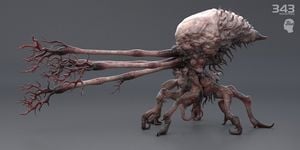
| |
| Biological overview | |
|
Classification: |
|
|
Species: |
|
| Physical information | |
|
Avg. height: |
89.6 centimeters (2 ft 11.3 in) to 131.4 centimeters (4 ft 3.7 in)[1] |
|
Avg. weight: |
16.8 kilograms (37 lb) to 28.6 kilograms (63 lb)[1] |
|
Distinctions: |
Small, sac-like creatures with many tentacles for probing with a frond-like array. |
- "Do not let them touch you! It is said they will consume your body and mind!"
- — Pavium warning his troops of pod infectors.[2]
The pod infector (sometimes shortened as pod),[3] often ubiquitously called the Flood infection form,[4][5] is a stage of the virulent Flood xenoform. It serves as the primary form for spreading the Flood infection due to its effectiveness compared to mere Flood spores when deployed in large numbers. Subsequently, it is usually the first Flood form to be produced as well as the most commonly encountered Flood form.[3]
Overview[edit]
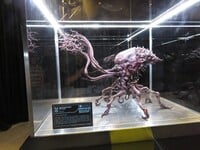
Physical characteristics[edit]
- "As you can see, it has tentacles in place of legs, plus a couple of extremely sharp penetrators, which they use to invade the victim's central nervous system and take control of it."
- — Melissa McKay describing a pod infector.[6]
Pod infectors have soft, pod-shaped bodies; they are characterized by a small, sagging brown lobe rising from the top of its back,[4] while its frontal surface has numerous tentacle-like appendages and a frond-like array, which acts as the creature's sensory system.[7][5] Their tendrils are multi-purpose locomotion systems and insidious methods of control.[7][5] Used for attacking and infecting organisms,[8] each tendril ends in nano-scale barbs, which can latch onto a target's body, slice open bare skin,[9] and even cut through armor or environmental suits.[7][5] The pod infector's bulbous body is filled with noxious gases,[5] while its numerous tentacles allow them to travel at high rates of speed and leap surprising distances in pursuit of a host.[1][10]
The pod infector does not feel pain or fear.[11] Though barely intelligent on their own, once a pod infector infiltrates a sentient creature, they turn the victim's cognitive power to the furtherance of Flood goals. Each pod infector able to sift through memories of any sentient creature to learn of military countermeasures, security access codes, and the location of population centers. This information is then shared with other Flood through their connection with the key minds.[7]
Function[edit]
- "You can see how the body has been transformed by the genetic restructuring of the Flood infection. The small creatures carry spores that cause a host to mutate. The mutated host then produces spores that can pass the Flood to others. It is insidious and elegant. As long as any hosts remain, the Flood is virulent."
- — 343 Guilty Spark explains the infection process.[12]
Pod infectors appear to be developed from a form vaguely resembling a larva or tadpole but bearing the basic superficial characteristics of a pod infector.[13] Once the parasite can establish a hive, it can begin to produce massive numbers of infection forms that spread out in search of new sentients to infect, and non-sapient animals on which to feed; pod infectors serve as the most basic and common type of infection forms. Both ground and airborne infection forms are used as living weapons, hurling themselves at the enemy to overwhelm defenses and assimilate the unprepared.[5] The Flood blister itself is an infection form, incubating spores as well as carrying pod infectors; when ruptured, the blister releases the pod infectors.[14][15] Carrier forms serve as mobile incubators of pod infectors; when they are in close range of enemies, or when their sacs are perforated, they rapidly swell and then detonate,[16] releasing pod infectors being held within.[17] Flood pure forms, including the spawner form and the tank form, can gestate pod infectors to spread the Flood infection.[18][19]
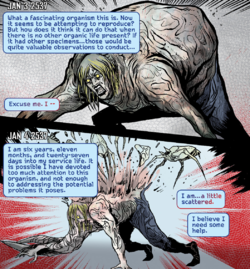
Serving as the primary vector for the Flood infection, pod infectors usually attack en masse, overwhelming and overpowering their prey, until one is able to burrow into the victim's flesh,[1] As with other infection forms, the pod infector has an array of "penetrators", which are barbed tentacles that can cut through flesh and armor.[7][5] Energy shielding destroys pod infectors on contact, causing them to explode in a small burst of gas and flesh.[20][21][22] When a pod infector attacks a victim, its tentacles insert into the spine,[23][24] with the goal of invading the target's central nervous system,[6] which then initiates a violent transformation triggered by the the Flood spores carried by the pod infector.[12] Once the target is compromised, the pod infector injects Flood Super Cells to suborn the victim's nervous system,[5] "digesting" the DNA of its victims,[25] while the pod infector itself bores into the host body to hollow out a nest, quickly twisting the remains of its victim into a combat or carrier form.[5]
Due to the balloon-like qualities of the pod infector, it could deflate itself to fit inside the victim's body.[26] Even if the pod infector is quickly removed, Flood cells in the wounds will slowly consume the victim and turn them into quivering, spore-packed blisters.[7][27] The Flood utilizes the hosts' nervous system and calcium store to mutate its body;[28] if the infected host has sufficient biomass for self-sustenance, it will mutate neurologically and physiologically into a combat form.[16] The pod infector is capable of augmenting its new body and repair minor damage;[11] as such, combat forms typically possess unnatural physical strength, perhaps gained through the mutation of the host's musculoskeletal structures.[16] Otherwise, sections of the host's body are consumed and converted into FSC, with much of their internal organs being consumed and replaced with FSC accretions that function as support lattices. Some limbs and sensory organs are retained on the combat form to enable use of tools, weapons, or vehicles; though the pod infector sees the environment using its own sensory organs—often the flexible fronds or antennae on the end of narrow tendrils—while whatever remains of the host's native senses are usually redundant and ignored. Combat forms also tend to retain some of its host's characteristics; sapient hosts are generally made into the most basic version of combat form, simply known as an attacker form,[11] whereas non-sapient hosts are made into thrasher or swarm forms.[29] Human attacker forms are notably known for their agility and swift movement rather than the heavy and dense frame of the their Sangheili counterparts.[30] If its host has been heavily damaged, a pod infector may abandon its host to look for a new one. Conversely, if the pod infector inside an attacker form has been destroyed, but the attacker form itself is intact enough to continue serving its purpose, a loose pod infector may burrow inside the body and replace the one that mutated it, effectively "re-animating" the attacker form.[22]
In some circumstance, the pod infector is unable to completely dominate the original personality and the victim remains fully aware of their irrevocable transformation and their being used as a tool of the Flood. Though their bodies are bent to the Flood's will, occasionally the victim can still whisper for mercy or cry out in pain. More often, the parasite will speak on their behalf, using stolen thoughts and memories as a psychological weapon, terrorizing both the host and anyone unfortunate enough to be within earshot.[11][31] This was the fate of Wallace Jenkins during the Battle of Installation 04; a pod infector had been severely weakened during long periods of hibernation, and while strong enough to take over and transform Jenkins' body, it lacked the force and clarity to completely control Jenkins.[32] With the Flood mind weakened, Jenkins survived infection, and even remained conscious, with short periods of time where he could exert control over his mutated body.[33][34]
While an effective vector of infection against armored and shielded organisms—including those equipped with atmospheric filters—a pod infector is not necessary for the Flood to infect a host; merely ingesting Flood spores or inserting them via a wound is sufficient to initiate Flood conversion—in two notable instances, Flood spores were introduced into the body through a bite wound. Such infection may occur several seconds or perhaps minutes later, yet the transformation will occur almost instantaneously once it has begun.[35][27]
Trivia[edit]
- Robert McLees's design of the pod infector was inspired by a scene in the children's book The Saggy Baggy Elephant, in which a palm tree was launched into the air by dancing elephants; the illustration formed a shape that became the basis of the pod infector.[36]
- In Halo: Combat Evolved, if a pod infector latches itself onto a Marine or one of the Covenant, instead of mutating the host, it will become irrevocably attached until the host is dead. If at least one pod infector manages to leap onto an unshielded player in this game, it will deal a noticeable amount of damage (this will increase depending on difficulty and number of pod infectors attached), fall off, and attempt to strike the player again. This effect on the player also appears in Halo 3.
- In Halo: Combat Evolved, pod infectors are not affected by fall damage, most likely due to the script or slow speed during freefall.
- An energy sword will not lose energy by killing pod infectors in Halo 2 and Halo 3, but this method is highly ineffective as pod infectors are extremely hard to hit with an energy sword.
- Pod infectors do not add points to the player's meta-score when the campaign scoring is activated in Halo 3 and Halo: The Master Chief Collection. This is most likely because pod infectors come in swarms, and could be used to rack up points with almost no effort.
- Unlike in Halo: Combat Evolved and Halo 2, the pod infectors in Halo 3 float in water. Thus, they cannot infect corpses that are in water ponds because of this animation.
- A cut enemy intended to be included in Halo 3 was the
flood_infection_banger, a variant of pod infector which would explode like a plasma grenade when destroyed.[37] - In Halo Wars, when Sergeant Forge shoots the pod infectors that were attacking Professor Anders, they do not pop like pod infectors usually do in other appearances. Instead, they simply fall lifelessly to the ground. Similarly, in Halo Wars 2: Awakening the Nightmare, a spike round pinned a pod infector into the wall.
Gallery[edit]

|
See our gameplay information related to Pod infector on its gameplay page. |

|
Browse more images in this article's gallery page. |
Concept art and illustrations[edit]
Pod infectors attacking Avery Johnson and Wallace Jenkins in Breaking Quarantine.
A pod infector inside the UNSC Spirit of Fire's cryo-room in Halo: Escalation.
Jerome-092 destroying a pod infector in a single punch in Something has Happened.
Halo Wars 2 concept art depicting Banished forces succumbing to a tidal wave of pod infectors.
Renders[edit]
Render of the Halo 2 pod infector in Halo: The Master Chief Collection.
A render of the pod infector asset created for Halo Wars' cutscenes.
A render of the Pod Infector built for Halo 2: Anniversary''s cutscenes.
Screenshots[edit]
A pod infector in the Threshold gas mine in Halo 2.
A pod infector in Halo 3.
Pod infectors approaching Professor Anders in Halo Wars.
Pod infectors in Halo: Spartan Assault.
A pod infector straggling the Prophet of Mercy in Halo 2: Anniversary.
A Heretic Unggoy fighting pod infectors in Halo 2: Anniversary.
A pod infector trapped in a Cylix on Installation 07 in Halo Infinite.
List of appearances[edit]
|
Sources[edit]
- ^ a b c d Halo: Combat Evolved Anniversary, Library: Infection Form
- ^ Halo Wars 2, campaign level Fighting Retreat
- ^ a b Halo Wars 2, Phoenix Logs: Pod Infectors
- ^ a b Halo Encyclopedia (2011 edition), page 164
- ^ a b c d e f g h i Halo Encyclopedia (2022 edition), page 406
- ^ a b Halo: The Flood, chapter 10: "As you can see, it has tentacles in place of legs, plus a couple of extremely sharp penetrators, which they use to invade the victim's central nervous system and take control of it."
- ^ a b c d e f Halo Wars 2, Phoenix Logs: Infection Forms
- ^ Halo Encyclopedia (2011 edition), page 180
- ^ Halo: The Flood, chapter 12: "The Spartan gave a cry of pain, felt the tentacle slide down toward his spine, and knew it was over."
- ^ Halo: Official Spartan Field Manual, page 174
- ^ a b c d Halo Encyclopedia (2022 edition), page 408
- ^ a b Halo: Combat Evolved, campaign level The Library: "You can see how the body has been transformed by the genetic restructuring of the Flood infection. The small creatures carry spores that cause a host to mutate. The mutated host then produces spores that can pass the Flood to others. It is insidious and elegant. As long as any hosts remain, the Flood is virulent."
- ^ Bungie.net, One Final Effort (4/16/2010) (Retrieved on Apr 11, 2013) [archive]
- ^ Halo 3, campaign level Cortana
- ^ Halo Encyclopedia (2022 edition), page 407
- ^ a b c Halo Encyclopedia (2011 edition), page 165
- ^ Halo Encyclopedia (2022 edition), page 409
- ^ Halo Encyclopedia (2011 edition), page 166
- ^ Halo Wars 2, Phoenix Logs: Spawners
- ^ Halo: Combat Evolved, gameplay
- ^ Halo 2, gameplay
- ^ a b Halo 3, gameplay
- ^ Halo: The Flood, chapter 6: "There was a cry of pain as something landed on Private Riley’s back, drove a needlelike penetrator through his skin, and aimed it down toward his spine."
- ^ Halo: The Flood, chapter 9: "...because ever since the infection form had inserted its penetrator into his spine, Private Wallace A. Jenkins had been sharing his physical form with something he thought of as "the other.""
- ^ The Art of Halo 3, page 26
- ^ Halo: The Flood, chapter 10: "If you peek through the hole in her chest you can see the remains of the infection form that deflated itself enough to fit in around her heart and lungs."
- ^ a b Halo: Evolutions - The Mona Lisa
- ^ The Art of Halo, page 50
- ^ Halo Encyclopedia (2022 edition), page 409
- ^ Halo: Combat Evolved Anniversary, Library (feature): Human Combat Form
- ^ Halo Wars 2, Phoenix Logs: Infected
- ^ Halo: The Flood, chapter 6: "Due to some fluke, some random toss of the galactic dice, the mind that invaded his body had been severely weakened during the long period of hibernation, and while strong enough to take over and begin the work necessary to create a combat form, it lacked the force and clarity required to completely dominate its host the way it was supposed to."
- ^ Halo: The Flood, chapter 10: "Jenkins had used pantomime to request a mirror. A well-meaning Corporal brought one in, held it up in front of the soldier's devastated face, and was frightened when he tried to scream."
- ^ Halo: The Flood, chapter 12: "Jenkins, still unable to speak, managed to mouth the words “thank you.”"
- ^ Halo Wars, campaign level Anders' Signal
- ^ Rolling Stone, ‘Halo 2’ Is a Classic, But Its Development Was a Mess (Retrieved on Nov 10, 2024) [archive]
- ^ YouTube - Lord Zedd, Halo 3 - Cut Enemy: Flood Infection "Banger"
| |||||||||||||||||||||||||||||||||
